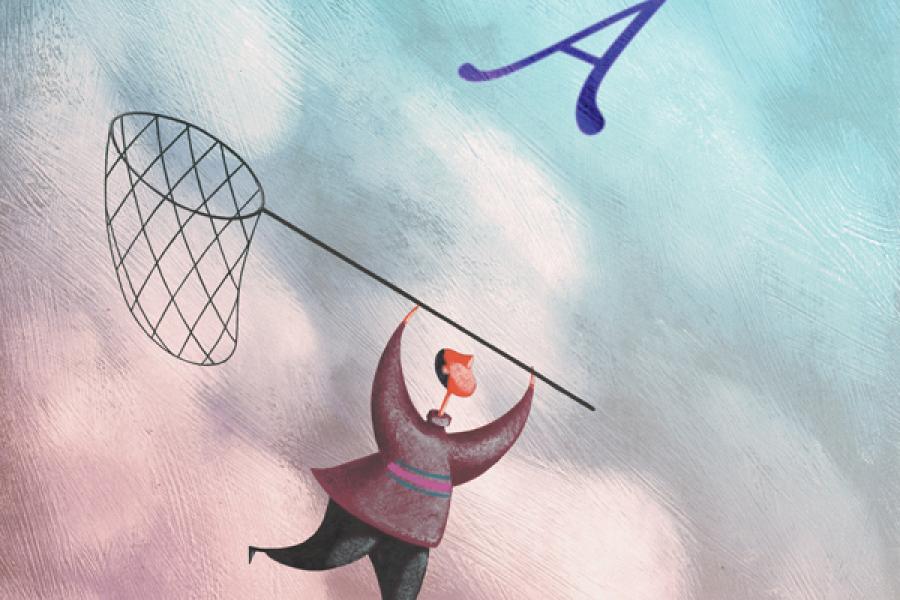Rob* ambles into the adult literacy office at an uptown branch of the Toronto Public Library and slumps into a chair in the second cubicle. He has dreadlocks, and tattoos cover his arms. “Worked a lot,” Rob says. “Was too tired to do much homework.” As his tutor, I have become accustomed to this refrain. Improvements would come faster if Rob practised consistently, but that is difficult since he also needs to provide for his family of six. Still, he has made a lot of progress since he started working on his literacy skills three years ago.
Although the decor at this adult centre brings to mind a Grade 2 classroom — the walls are plastered with cheerful posters outlining vowel sounds — the rules are for grownups: there are no repercussions for incomplete homework. The program fosters collaborative peer relationships between tutor and learner. For the next two hours, Rob and I work on his literacy and numeracy skills, but much of that is review. Adults aren’t the sponges children are when it comes to learning, and returning to classes is particularly challenging for someone who never learned how to learn. Although Rob attended high school until Grade 10, he began this program uncertain of the alphabet and unable to count past 20.
You may unsubscribe from any of our newsletters at any time.
Rob’s case isn’t unique. Nearly half of all Canadian adults don’t have the literacy skills needed to function independently in their everyday lives. A 2013 study by the Organisation for Economic Co-operation and Development (OECD) scored Canadians on a scale of one to five. The results showed that about 17 percent of Canadian adults struggle at level 1 or below (those unable to complete the assessment). And 49 percent of Canadian adults ranked below skill level 3, considered the level required to thrive in today’s world.
“Half the people you walk down the street next to struggle everyday with living in the 21st century,” says Gillian Mason, president of ABC Life Literacy Canada. “They live in a certain amount of fog as a result because there is so much coming at them that they can’t decode and use.” And although this crisis is escalating due to the increasing complexity of contemporary life, the federal government recently cut much-needed core funding for literacy organizations and research.
Contrary to common belief, newcomers to Canada do not have a significant impact on our national literacy statistics, say experts. Rather, the problem is both nationwide and systemic — and often goes unnoticed since those most affected aren’t fully participating in society. Mason emphasizes that literacy is not a binary issue of can or cannot read, but should be better understood as a continuum. For example, while people who score in the high end of level 2 can often find jobs and manage daily life tasks, if anything changes, such as the loss of employment, they may not have the tools to get themselves back on track.
Canada is not the only industrialized nation struggling with literacy. The OECD study rated 23 other countries and sub-national regions on numeracy, literacy and problem-solving skills. Canada ranked 11th in literacy — close to average and ahead of France, the United States and the United Kingdom, but behind Japan, Finland and Australia.
Three years ago, Beverly* left her children and grandchildren to come to Canada. Although English is her first language, she struggles with basic tasks. Working long days in a loud factory often gives her a headache, but she always finds the energy to meet Andrea Cookson, her tutor at the Toronto Public Library’s literacy program. They have been working on alphabet sounds, practising reading and printing, and learning how to write personal information.
“[Our work] makes a big difference in my life,” says Beverly. “If I go to the doctor and I have to write my name and address, I can manage it for myself and I don’t need to get stressed out.” Beverly’s long-term goal is to gain the skills to take a class on nutrition so that she can teach others about the importance of eating well. “I really want to make a big difference in myself, and to know that I can do something for myself to be happier and proud.”
Janet*, another participant in the Toronto Public Library program, has successfully developed the skills required to complete a job-training course. She is now employed as a personal support worker but wants to go further: she and her tutor are studying medication vocabulary so that Janet can assume more responsibilities at work.
The system that supports people like Rob, Beverly and Janet is facing new challenges, however. Last spring, the federal government cancelled core funding to 16 provincial and territorial literacy coalitions, as well as six national literacy organizations. Learners won’t bear the brunt of the cuts: the organizations that lost funding are those that create resources, conduct research and set strategy to improve literacy nationwide. In an e-mail to the Ottawa Citizen, Alexandra Fortier, a spokesperson for federal Employment and Social Development Minister Jason Kenney, stated, “Our government is committed to ensuring that federal funding for literacy is no longer spent on administration and countless research papers, but instead is invested in projects that result in Canadians receiving the literacy skills they need to obtain jobs.”
Critics say the focus on labour abandons those with low literacy levels — millions of Canadians who need help before they can learn new job skills. Furthermore, explains Ghazal Niknazar, community co-ordinator at the Metro Toronto Movement for Literacy, without core funding, organizations must operate project-to-project, resulting in inconsistent staffing, lack of long-term vision and constant worry about money. Research papers help literacy organizations understand and prepare for broader trends, she says, and the national and provincial network, which employs administrative staff, gives smaller programs a voice at the federal level.
Many of the 22 literacy institutions that lost their funding last spring have already been forced to lay off staff or even close, while others are struggling with an uncertain future. For example, the Canadian Literacy and Learning Network, which represented more than 2,500 organizations across the country and had been a hub for research and communication for the literacy community since 1976, announced its closure in September.
Another funding casualty is the non-profit organization Copian, with its online library for teachers, learners and researchers across the country. Their services have been particularly valuable to programs in rural communities, which rely on them for resources. In May, Copian learned its federal funding would run out in six weeks and suspended its database for several months. The organization struggled to replace those funds because most donors want to put their money “where the magic happens,” explains Copian CEO Bill Stirling. “We are a layer or two back from that.” In October, Copian managed to relaunch the database, albeit in a streamlined version and without the resources to update it.
The Toronto Public Library program has not been directly affected by the federal funding cuts because it is provincially and municipally funded. So Janet, Beverly and Rob will continue to improve their literacy skills, while also gaining confidence and participating more fully in society. “[Learners] come to us, and they’ve had so many struggles and setbacks,” says Termeh Norouzi, literacy co-ordinator for the Toronto Public Library. “Over time, they learn new skills, but they’re also learning how to interact, how to be more social, how to have a voice and to know their voice is valuable.”
Mason, of ABC Life Literacy Canada, agrees. “Some of us invest in ourselves throughout our lives because we have confidence we can, and the tools, insights and supports to do so,” she says. “If you don’t have those things, it’s a really tough slog.”
In the face of serious funding challenges, one might expect literacy advocates and students to be discouraged. But what is striking is their determination. “It is not an us-them problem,” says Mason. “It is the person sitting next to you. The solutions lie in our collective response to this challenge.”
*Students’ names have been changed to protect their privacy.
This story originally appeared in the December 2014 issue of The Observer with the title “Canada’s hidden literacy crisis.”















